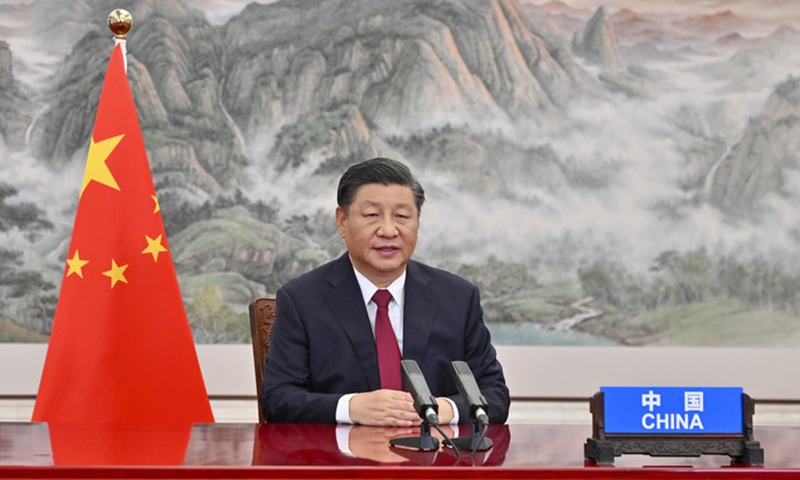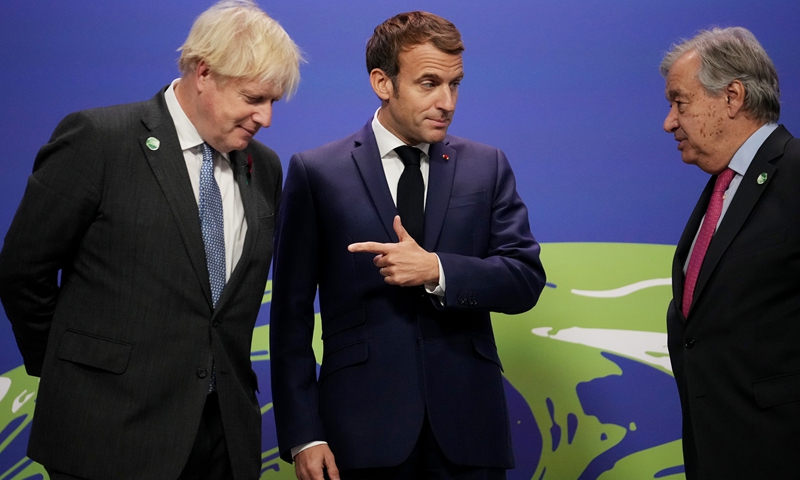
File photo
Chinese President Xi Jinping on Monday called on all parties to take stronger actions to jointly tackle the climate challenge in a written statement for the World Leaders Summit at the 26th session of the Conference of the Parties (COP26) to the United Nations Framework Convention on Climate Change, which is being held in Glasgow from Monday to Tuesday.
To respond to climate change and revive the world economy, Xi made a three-pronged proposal to address climate challenge, including upholding multilateral consensus, focusing on concrete actions, and accelerating the green transition.
Parties need to honor their commitments, set realistic targets and visions, and do their best according to national conditions to deliver their climate action measures. Developed countries should not only do more themselves, but should also provide support to help developing countries do better, Xi noted.
He added that China will speed up the green and low-carbon energy transition, vigorously develop renewable energy, and plan and build large wind and photovoltaic power stations.
Xi said the country will roll out specific implementation plans for key areas such as energy, industry, construction and transport, and for key sectors such as coal, electricity, iron and steel, and cement, as well as supporting measures in terms of science and technology, carbon sink, fiscal and taxation, and financial incentives.
"These measures will form a '1+N' policy framework for delivering carbon peak and carbon neutrality, with clearly-defined timetable, roadmap and blueprint," he added.
Just before countries sit down for talks, the US leader, a country that angered the world with its flip-flop on the climate issue, disappointed allies and developing countries for failing to fulfill many of its pledges, and name-calling China and Russia for "not showing up" on climate change commitments.
When analysts snubbed Washington's trick of diverting the world's attention from its own failure by pointing a finger at others, they also warned the US that the climate issue is not for staging a political show. Whoever seeks leadership on this issue must commit action, instead of playing lip service.
More than 120 leaders will speak Monday in the very same city of the COP26 climate talks, where they will set the tone for two weeks of negotiations, CNN reported.
The Global Times learned that a Chinese delegation of approximately 50 people, including Xie Zhenhua, China's Special Envoy for Climate Change, will be participating in COP26 talks, though smaller than previous delegations.
The Chinese delegation has three items on its agenda: finalize the last remaining piece of the Paris Agreement rulebook; finance poor countries in dealing with global warming; and talk to certain countries to take more action.

British Prime Minister Boris Johnson (left) and UN Secretary-General Antonio Guterres (right) greet French President Emmanuel Macron as they arrive for day two of COP26 on November 1, 2021 in Glasgow, Scotland. The conference will run for two weeks, ending on November 12. Photo: VCG
Rebutting Biden
At the close of the two-day G20 leaders' summit in Rome, US President Joe Biden singled out China and Russia, saying that "with regard to the disappointment, the disappointment relates to the fact that … not only Russia but China basically didn't show up in terms of any commitments to deal with climate change."
"More has to be done," Biden rumbled on. "But it's going to require us to continue to focus on what China's not doing, what Russia's not doing and what Saudi Arabia is not doing."
In response, Wang Wenbin, spokesperson of China's Ministry of Foreign Affairs, said that China's target of achieving peak emissions by 2030 and carbon neutrality by 2060 marks the world's highest reduction in carbon emissions intensity and the shortest time in achieving the goal of going from carbon peak to carbon neutrality in global history.
It took the EU 71 years, the US 43 years, and Japan 37 years to move from carbon peak to carbon neutrality, while China leaves itself with merely 30 years, Wang said, pointing out that during the 200 years of industrialization, the developed world has "unshakable" historical responsibility for greenhouse emissions.
For instance, the US historical emissions per capita is eight times that of China's, and the US rejection to ratify the Kyoto Protocol and withdrawal from the Paris agreement have "severely impaired the confidence and efficiency of global cooperation on climate change."
An anonymous official from the Chinese delegation to COP26 said that climate change should not be a topic for geopolitical rivalry, but a boost for cooperation; and he hopes certain countries won't link it with geopolitics.
Yang Fuqiang, a research fellow at Peking University's Research Institute for Energy, described Biden's attack on China, Russia and Saudi Arabia as an "attack in the way of defense" approach to divert the world's attention to US backpedaling.
Since Biden took office, he has been talking aloud about a US comeback to the global climate issue, and deems COP26 as his chance of shoring up global leadership in tackling global warming. Yet he arrived with his plan of spending $555 billion on cutting greenhouse gas emissions waiting for congressional approval.
Developing countries criticized the US and other rich countries for falling short of the $100 billion a year to help developing countries fight climate change until at least 2023, a key part of the 2015 Paris climate accord.
Yang pointed out that the most direct way for Washington to show its commitment to joining the global effort to battle global warming is to fork over the money it promised, and make up the few years' gap when it suddenly left the Paris agreement.
Lü Xiang, a research fellow at the Chinese Academy of Social Sciences in Beijing, said that aside from money, technology transfer is also crucial for rich countries to help their developing counterparts. Biden barely mentioned technology transfer in helping poorer countries tackle greenhouse emissions. Judging by Washington's more and more restrictive technology policy, developing countries cannot count on the US to help them technologically, Lü said.
He said those big words with little action have exposed US hypocrisy on climate issues.
Political agenda Lü said that the US and some Western countries have clearly let their political agenda override climate issues at COP26. For the US, for instance, since Biden has done very little to push forward domestic legislation, nor has he achieved a major diplomatic victory, he considers backing the Paris agreement and climate issue as the only breakthroughs he can tout, Lü said.
Hours before world leaders spoke at COP26, the White House on Monday issued an article entitled "President Biden Renews U.S. Leadership on World Stage at U.N. Climate Conference (COP26)."
"President Biden will outline the bold steps his administration is taking in his whole-of-government approach to combat climate change, underscore how bold action delivers economic prosperity and peace and security, and rally countries from every corner of the world to step up their ambition and confront this existential threat during a decisive decade," the article said.
However, US credibility on the climate issue was already undermined by its backpedal on climate accords; and its inability to fulfill its promises stands against the world's efforts to achieve climate goals, said experts, noting that the climate issue is not for a political show. "The world is tired of hollow promises. Those who really want to take leadership must do more than play lip service," Yang said.





